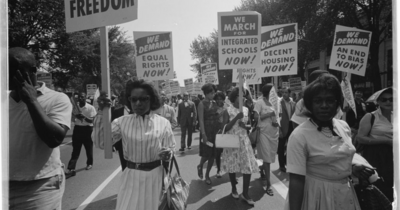
Dr. King's Legacy Isn't Just Racial But Economic. We Have a Long Way to Go | Opinion
Six decades after the March on Washington for Jobs and Freedom, our work remains unfinished. However, hope is not lost.

On August 28th, 1963, a seismic shift reverberated through the fight for social, racial, and economic justice in the United States. Thousands of Americans from diverse backgrounds converged on the nation's capital, united in solidarity. Workers with calloused hands, advocates with voices ablaze, and elected officials echoing the demands of their constituents, all gathered with a common aspiration: civil rights and economic opportunity for all, especially African Americans who had historically faced systemic exclusion.
[...]
Dr. King's prophetic speech remains a memorable hallmark etched across our collective memory; still, the true weight of the March on Washington's legacy extends beyond his iconic words. It rests within the powerful unity it kindled among working families, labor unions, and advocates for social justice. A testament to the strength of solidarity, its power has resonated across time and now finds its resurgence through the renewed energy of labor organizing.
More than just a pivotal moment in history, the March on Washington was a clarion call for jobs and economic justice, two critical components that underpin a fair and just society.
More than just a pivotal moment in history, the March on Washington was a clarion call for jobs and economic justice, two critical components that underpin a fair and just society. Our democracy and economy are inextricably linked; economic power is intertwined with political power. Policies that reflect this reality are essential to ensure individuals and their families can thrive.
[...]
Today, workers are unapologetically asserting their right to a fair share, as the promise of jobs and freedom remains unfulfilled in America. A renewed labor movement is sweeping across the nation, its energy embodied in the resonating calls for good jobs and labor strikes. The Writers Guild of America and the Screen Actors Guild jointly strike for the first time in 63 years. Hotel workers in Southern California orchestrate coordinated work stoppages, while the Teamsters secure wage increases at UPS, averting a strike. The United Auto Workers teeter on the brink of their own labor movement.
To usher in an America where opportunity is equitable for all, we must embrace an economic democracy that enables people to shape the economic conditions that impact their lives. Economic democracy is not an abstract ideal; it's an imperative for dismantling power structures entrenched in racialized capitalism and economic inequality.
Read the full article in Newseek




